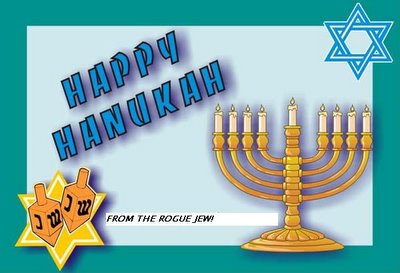
HERE ARE SOME HANUKKAH FACTS FOR THOSE NOT FAMILIAR WITH THIS FESTIVE JEWISH HOLIDAY. AS SOME SAY, THIS IS ONE OF THE HOLIDAYS THAT CAN BE DESCRIBED IN LESS THEN 10 WORDS..."THEY TRIED TO KILL US, THEY FAILED, LET'S EAT!"
The Hebrew word Hanukkah means "dedication." The roots of this name, and the Hanukkah holiday, come from the second century B.C.E. (Before the Common Era). Chafing under foreign domination, a band of Jews led by Mattathias took to the hills of Judea in open revolt against the Seleucid regime of Antiochus IV.
Mattathias' son Judah took charge of the rebellion after his father's death. He was given the nickname "the Maccabee" ("the hammer"). Antiochus sent thousands of well-trained and well-armed troops to the land of Israel to crush the rebellion. The Maccabees responded with a brilliant campaign of guerilla warfare, and succeeded in driving the foreigners from their land.
Jewish fighters entered Jerusalem in December, 164 B.C.E. They found the sacred Temple in shambles, defiled and desecrated by foreign soldiers. They cleansed the Temple and re-dedicated it on the 25th day of the Jewish month of Kislev. They observed a feast of dedication for eight days in honor of their historic victory.
The contemporary observance of Hanukkah features the lighting of a hanukkiyah, a special Hanukkah menorah with eight branches and a ninth holder for the shamash, or helper candle. Popular legend connects this ritual with the tale of the cruse of pure oil that miraculously burned for eight days rather than one.
On the first night of Hanukkah, two candles are placed in the menorah. One serves as the shamash to be used for lighting the other candle. On each successive night, another candle is added to the menorah. By the time we reach the last night of Hanukkah, eight candles are glowing brightly in celebration of this beautiful festival.
Other familiar Hanukkah customs include spinning the draydal (a special top with Hebrew letters on the sides), eating potato latkes (pancakes) and sufganiyot (jelly donuts) and giving gifts of gelt (coins) to children.
In the broad sweep of Jewish tradition, Hanukkah is considered a minor holiday. It is not a yom tov, a holy day, akin to Rosh Hashanah or Passover. Hanukkah, like Purim, is a post-Biblical holiday, a happy, fun-filled celebration for the young and the young-at-heart.


No comments:
Post a Comment